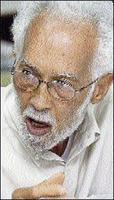Daraine Luton, Staff Reporter



Left: Wilmott: When people are empowered they can reject the dons. Center: Levy: Garrisons are communities disabled by gangs and guns. Right: Cooke: We cannot sit and wait for the politicians.
CIVIL SOCIETY is being encouraged to continue working towards the dismantling of garrison constituencies, even as their calls for additional support get louder.
Major Richard Cooke of the Joy Town Foundation, who was speaking at a Gleaner Editors' Forum held yesterday at the newspaper's central Kingston offices, said political leadership has to be a key aspect of dismantling garrisons, but "has to go far beyond the members of parliament".
The more the youth is empowered, the more the community is empowered and the less you are going to have dons having control and even the politicians."
Lost control
Politicians are said to have lost control of garrison communities, which are the home for many forms of organised crime. Cooke said dismantling garrisons was very important but noted that politicians alone could not do the job.
"We cannot sit and wait for the politicians. If we strengthen the community to help rebuild communities, it will go a far way," Cooke said.
The Church, according to Cooke, is one of the biggest NGOs and it should take on the task of redistributing benefits within communities.
Pastor Bobby Wilmot, of the Covenant Church, told the forum that, once the NGOs get involved, there would have to be a focus on youth. He warned, however, that "there are no overnight solutions" to the crime problems facing Jamaica and that it was critical that the people living in the communities be empowered.
"When people are empowered they can reject the dons," Wilmot said.
Garrison communities, according to Peace Management Initiative (PMI) member Horace Levy, are communities "disabled by gangs and guns". He said there are 785 communities in Jamaica's inner cities, and a significant number of them are garrisons.
Approximately 80 per cent of the murders in the Corporate Area occur in garrison communities.
Young politicians and representatives of civil society agreed there was a need to improve the social conditions within garrison communities and for the people who live within them to be empowered.
Secure place
Damion Crawford, member of the People's National Party (PNP) and lecturer at the University of the West Indies, noted that "while the politician gets the benefit of a secure seat, the leaders of the garrisons get the benefit of a secure place".
He said a strategy for breaking the ties between politicians and dons within the communities may be contained in taking money to be spent on community projects out of the hands of politicians.
"The money that is spent in a community does not have to be spent by the politicians and neither does the money have to be spent by the people who help them to win," Crawford said, arguing that it was better channelled through NGOs such as the Church.
Opposition Senator Basil Waite said successive administrations have "abandoned these communities and we have utilised them for political gains".
"When it gets into the height of the campaign, persons start bending over backward and courting the dons to ensure that they mobilise the support," Waite, the PNP's national organiser, said.
He added that, unless the social conditions within these communities were addressed, "we are going to be talking in 30 years, 40 years, 50 years about the same problem and it is going to be the same as it is now".
Physical state needs improvement
Government Senator Warren Newby agreed there needed to be an improvement in the physical state of garrison communities as well as social reform for the persons who live in them.
"Dismantling the garrisons is twinned with dismantling of these criminal enterprises. We ought to proceed with the dismantling along the lines of what took place in the United States with the RICO law," Newby added.
The RICO Act allowed for extended penalties for criminal acts performed as part of an ongoing criminal organisation.
daraine.luton@gleanerjm.com
Empowering NGOs
"If we can focus more on empowering the NGOs (non-governmental organisations) it can go a far way," Cooke said.
"We need to encourage people to get alongside the inner-city youth. There are many of them who do not want to be caught in the syndrome and in the trap. They are looking for a way out.

